
This is how dangerous AI can be.
Think you can spot the difference between content generated by an AI and content generated by a human? Read through the below and see if you can spot which sentences or paragraphs were compiled by an NLP algorithm.
Artificial Intelligence
Artificial intelligence is revolutionizing the world around us. It already powers our smartphones, but the implications don’t stop there. Artificial Intelligence will not only impact how we use technology, it will transform how we live, interact with others and work. It’s set to create new industries that didn’t exist before and disrupt existing ones.
The Emergence of AI
AlphaGo was a watershed moment. It was the first time an AI won against a top human player in a game that requires intuition and creativity. AlphaGo was developed by Google DeepMind, a British artificial intelligence company specializing in deep learning. In 2016, AlphaGo defeated Lee Sedol, one of the world’s best Go players. This moment is often referred to as when Artificial Intelligence became real and transformed us into Homo Digitalis. To many people this event represents possibly the most significant event this century.
The Potential Impacts of AI on VR
AlphaGo has moved humanity to a whole new level, but it’s just the beginning. We are still at the very beginning of AI and there is no telling how far it will go and what an impact it will have in the next decades to come. We already see AI in our everyday life in various ways, from simple applications like Amazon’s Alexa, to Google Assistant and Siri. Even when you take a picture with your smartphone, AI is at work as your camera analyzes what is happening in front of you and makes necessary adjustments to the settings. In the near future AI will significantly impact how we use VR and AR (Augmented Reality).
Immersive VR is one of the best possible mediums for AI to present itself and influence us. This is because VR is based on a person’s experience and perception. In order to create a compelling, realistic experience you have to create deep learning algorithms that understand and respond to actions. The AI needs to be able to differentiate between real actions by the user, gestures, body language and virtual content projected into the virtual space.
Virtual reality creates an environment where AI can truly develop itself as we will have a new way of experiencing our existence and perception of ourselves in relationship with others, society and nature.
Leave a Reply